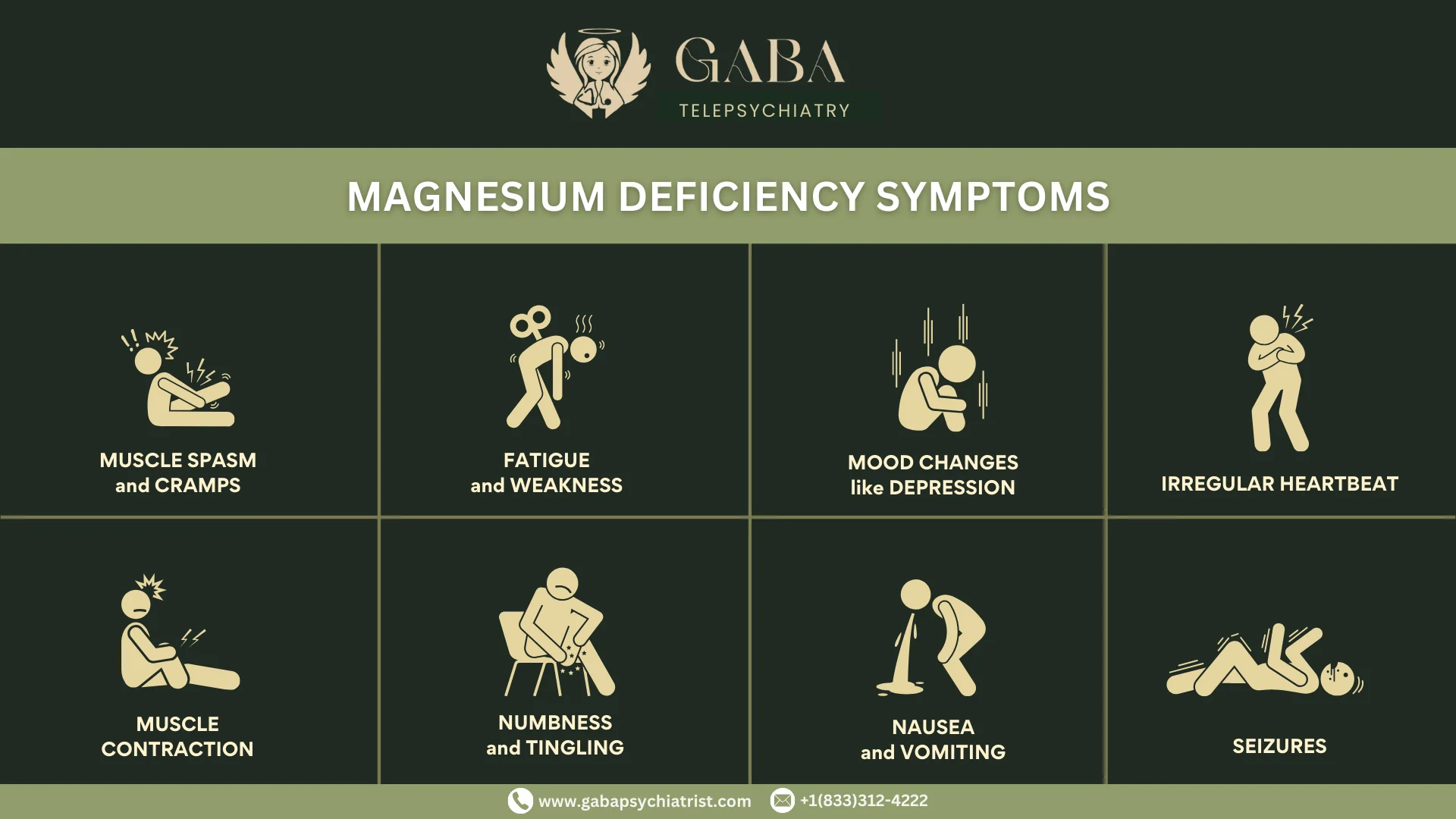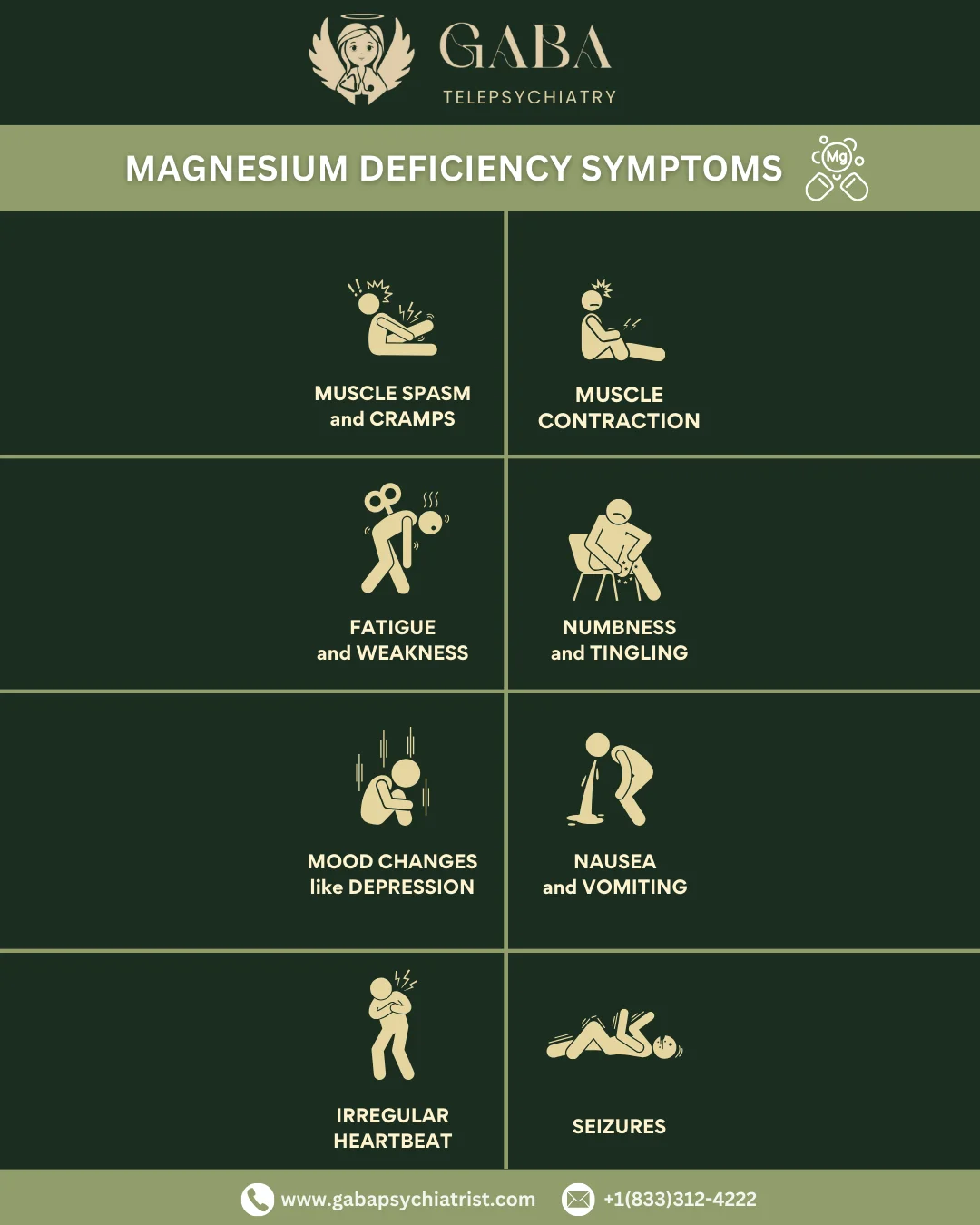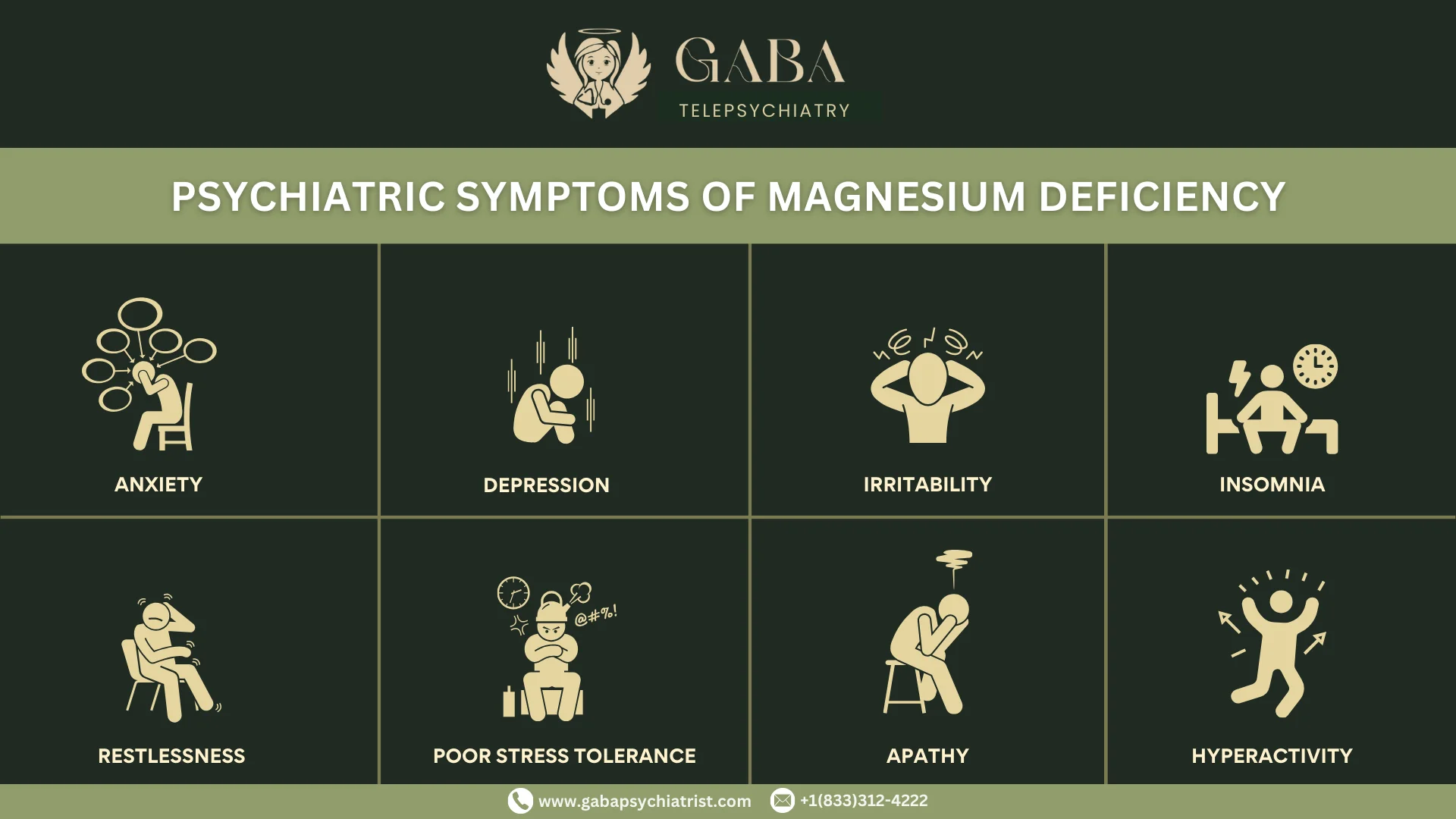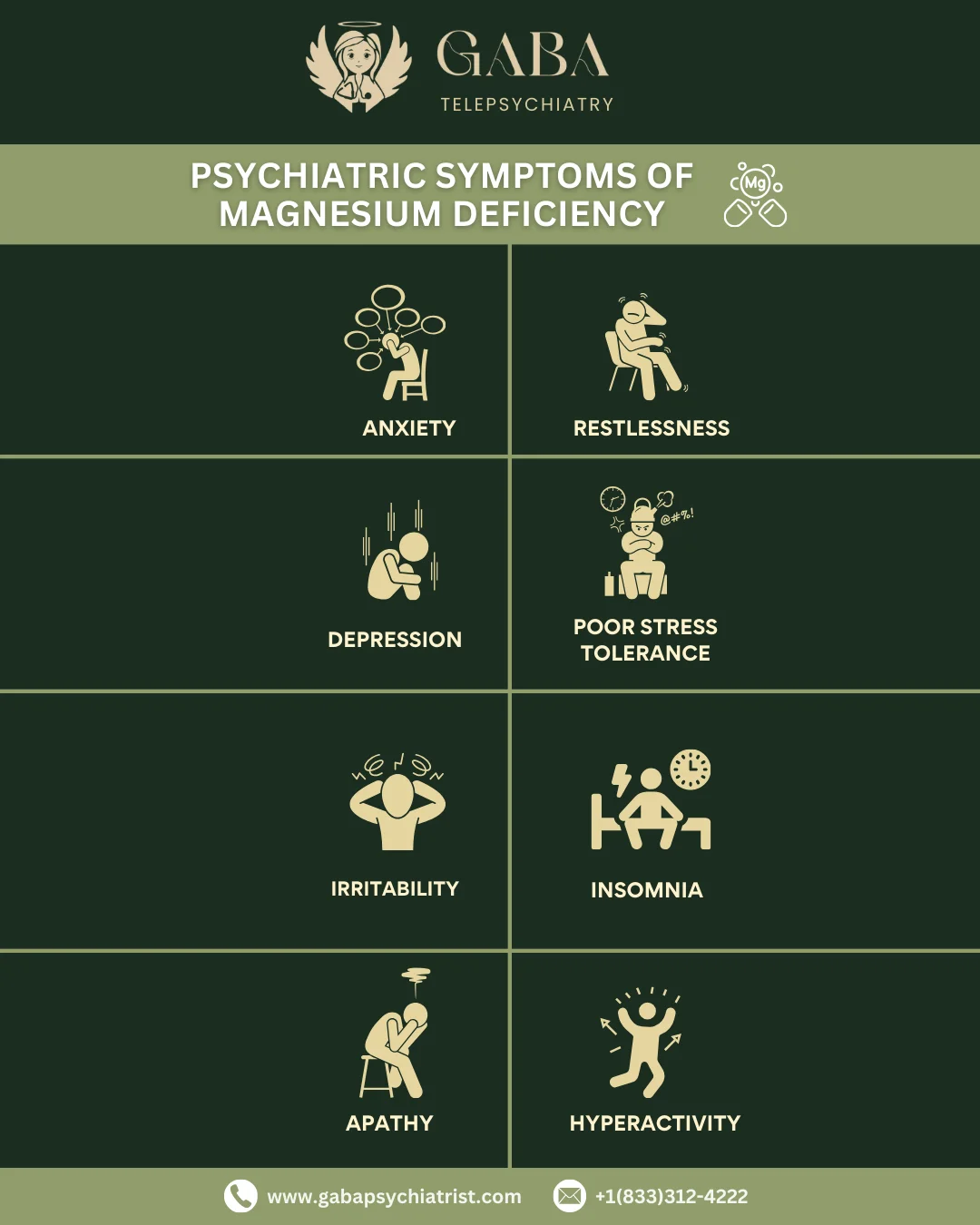Magnesium is an essential mineral that plays an important role in many bodily functions, including mood regulation. In addition, it is the fourth most abundant cation in the body. It has several other functions in the human body including its role as a cofactor for more than 300 enzymatic reactions.
It regulates many fundamental functions in the body, such as muscle contraction, neuromuscular conduction, glycemic control, myocardial contraction, and blood pressure. Magnesium also plays a vital role in energy production, active transmembrane transport for other ions, synthesis of nuclear materials, and bone development.
Hypomagnesemia is a relatively common occurrence in clinical medicine. Still, in most cases, magnesium deficiency is undiagnosed because serum magnesium does not reflect intracellular magnesium, the latter making up more than 99% of total body magnesium.
Because of chronic diseases, medication decreases in food crop magnesium contents, and the availability of refined and processed foods, the vast majority of people in modern societies are at risk for magnesium deficiency.
Furthermore, a magnesium supplement is taken by certain individuals worldwide to prevent suboptimal magnesium deficiency, especially if trying to obtain an optimal magnesium status to prevent chronic disease.
Magnesium Deficiency Symptoms
- Muscle spasms and cramps
- Muscle contraction and tremors
- Fatigue and weakness
- Numbness and tingling
- Irregular heartbeat
- Seizures
- Nausea and vomiting
- Mood changes
Magnesium Deficiency and Muscle Spasm
Muscle spasms or muscle cramps are very sudden and involuntary contractions of one or more muscles. These contractions can be for a shorter duration or can last for several minutes. They can occur in any muscle but are most common in the legs and feet, where the person feels a muscle-tightening effect. Muscle spasms can be painful and may result from overuse, dehydration, muscle strain, or imbalances in electrolytes such as calcium, magnesium, or potassium. In some cases, underlying medical conditions or medications can also contribute to muscle spasms. Health professionals usually advise stretching, massaging, and applying heat to the affected muscle as a treatment.
Studies show that magnesium is a mineral that plays a crucial role in muscle function, including muscle contraction and relaxation. Several mechanisms can contribute to muscle spasms when the magnesium level is low in the body. Magnesium is required to properly operate the sodium-potassium pump, which helps regulate muscle contractions. Low magnesium levels can lead to increased muscle excitability and difficulty in relaxing muscles after contraction, leading to spasms.
Magnesium Deficiency and Fatigue
Fatigue is a feeling of extreme tiredness or lack of energy that can make it difficult to carry out daily activities. It can be acute, lasting for a short period, or chronic, lasting for weeks, months, or even longer.
Fatigue and weakness are the most common symptoms of magnesium deficiency. From the studies, it has been confirmed that magnesium plays a crucial role in various bodily functions, including energy production. It is involved in maintaining mitochondrial function as well as the production of adenosine triphosphate (ATP), which is the primary energy currency of the cell. ATP is required for various cellular processes, including muscle contraction, nerve function, and maintenance of the body’s energy levels. And is crucial for energy production in cells. A magnesium deficiency can impair ATP production, leading to decreased energy levels and resulting in fatigue.
Magnesium Deficiency and Depression
Depression is a type of serious mood disorder that can negatively affect how you feel, think, and react. It causes feelings of persistent sadness, loss of interest in once enjoyable activities, and many physical and emotional problems. Depression may interfere with your ability to properly function at work, school, or in relationships.
Magnesium is required for the activation of vitamin D, which is important for mood regulation. A magnesium deficiency could impair vitamin D metabolism. Vitamin D receptors are found throughout the brain (such as the hippocampus), including areas involved in the development of depression. Also, magnesium deficiency promotes inflammation in the body, and chronic inflammation is thought to play a role in the development of depression, as magnesium deficiency could potentially contribute to this inflammatory response and result in a depressed mood.
Magnesium Deficiency and Irregular Heartbeat
An irregular heartbeat is also known as cardiac arrhythmia. It is often characterized as the heart feeling like it’s skipping a beat. Arrhythmia is a condition mainly caused when the electrical signals do not travel normally throughout the heart, causing it to beat out of normal rhythm (also known as sinus rhythm). There are many different types of arrhythmias, from occasional fluttering and palpitations to atrial fibrillation to lethal arrhythmias such as ventricular tachycardia and ventricular fibrillation that can even stop the heart and lead to death. If a person is experiencing any of these then immediate help should be taken from a health professional.
It has been observed that magnesium plays a critical role in maintaining the normal electrical activity of the heart, which is very essential for regulating the heart rate and rhythm. Magnesium is involved in the relaxation phase of the cardiac cycle as well as in the conduction system of the heart, which coordinates the electrical signals that regulate the heartbeat. Therefore, low levels of magnesium can lead to disruption of these important functions of the heart and can increase muscle irritability, which can manifest as irregular heartbeats.
Magnesium Deficiency and Muscle Contraction
Muscle contraction is the process of activation of tension-generating sites within muscle cells in which muscle fibers generate tension and shorten, leading to movement or the maintenance of a position. It is a complex physiological process involving various components of muscle cells and the nervous system. Muscle contraction is mainly the tightening, shortening, or lengthening of muscles when a person does some activity.
Magnesium is crucial for the production of adenosine triphosphate (ATP), which is known as the primary energy currency in the cells, including muscle cells. It has been concluded that ATP is required for muscle contraction. So, without sufficient magnesium in the body, ATP production is impaired, which leads to weakened muscle contractions or even prolonged contractions. Sufficient magnesium helps in the process of muscle relaxation by facilitating the removal of calcium from the muscle cell, allowing the muscle to return to its resting state.
Magnesium Deficiency and Tingling
Tingling sensations, also known as paresthesia, are a feeling as if many sharp points are being put quickly and lightly into your body. It is an unusual prickling sensation in any part of your body. Tingling can be caused by many things, such as cold, pressure, nerve damage, or disease. It can also be associated with emotions, such as excitement or fear.
It has been observed that magnesium is also involved in the regulation of some neurotransmitters, which are chemicals that transmit signals throughout the nervous system. It also plays a role in maintaining the electrical properties of nerve cells. A magnesium deficiency can disrupt these functions, leading to abnormal nerve signals and can result in tingling sensations.
Magnesium Deficiency and Nausea
Nausea is a sensation of discomfort in the stomach that often precedes vomiting, and it can cause an uncomfortable feeling in the back of the throat, the chest, or the top part of the stomach. It may be accompanied by an aversion to eating or an urge to vomit. It is a complex physiological response that can be triggered by various factors. The stimulation of nausea mainly originates at a site in the dorsal brainstem, which receives input from the vagus nerve. Subsequently, this input is relayed to higher brain regions to evoke the sensation of nausea. Nausea is experienced by almost everyone at least once in their lifetime.
Magnesium is essential for muscle relaxation, including the smooth muscles of the digestive tract, and it helps in the regulation of stomach acid production. A deficiency of magnesium can lead to spasms or tightness in these muscles, which may contribute to feelings of nausea. Low magnesium can also increase stomach acid, which can result in irritation in the stomach lining and lead to nausea.
Magnesium Deficiency and Seizures
A seizure is a sudden, uncontrolled burst of electrical activity that can cause changes in behavior, movements, or feelings, and in some cases, loss of consciousness. Having two or more seizures at least 24 hours apart that don’t have a known cause is considered to be epilepsy. There are many types of seizures, such as Generalized Seizures or Focal (Partial) Seizures, and they have a range of symptoms and severity. Seizure types vary by where they begin in the brain and how far they spread. Most seizures last from a few seconds to a few minutes. A seizure that lasts longer than five minutes is a medical emergency and needs immediate care.
Scientists have researched the link between magnesium and the occurrence of seizures, and it was identified that magnesium is involved in the function of gamma-aminobutyric acid (GABA), which is a neurotransmitter that has inhibitory effects on the brain. GABA helps calm nerve activity, and a magnesium deficiency can impair GABA function, which potentially increases the risk of seizures.
Psychiatric Symptoms of Magnesium Deficiency
Psychiatric symptoms are mental health symptoms that can occur when a person has low levels of magnesium. It affects a person’s thoughts, feelings, or behaviors and is related to mental health conditions.
- Anxiety
- Depressed mood
- Irritability
- Insomnia
- Restlessness
- Poor stress tolerance
- Apathy
- Hyperactivity
Magnesium Deficiency and Anxiety
Anxiety is often described as feelings of worry, nervousness, or unease about something with an uncertain outcome, and sometimes feelings of fear and dread don’t go away or get worse over time. It can be a response to stress or a perceived threat and is often accompanied by physical sensations such as increased heart rate, sweating, trembling, or feelings of tension.
It has been observed that Magnesium is involved in the regulation of neurotransmitters, including gamma-aminobutyric acid (GABA), which is an inhibitory neurotransmitter that helps calm the nervous system. A magnesium deficiency could lead to decreased GABA activity and can result in an increased level of anxiety.
In addition, the Hypothalamic-pituitary-adrenal (HPA) axis is a complex system involved in the body’s response to stress and anxiety. Magnesium may influence the HPA axis, and due to low levels of magnesium, there is dysregulation of this system, which results in anxiety disorders.
Magnesium Deficiency and Depressed Mood
A depressed mood is one of the psychiatric symptoms that has been associated with magnesium deficiency. Depressed mood, also known as sadness or the blues, is a common human emotion that everyone experiences from time to time. It is a normal reaction to loss, life struggles, or an injured self-esteem. When it lasts for an extended period, it may indicate clinical depression.
Magnesium is involved in the regulation of neurotransmitters, including serotonin, which is often referred to as the “feel-good” neurotransmitter. A magnesium deficiency could lead to imbalances in neurotransmitters, potentially contributing to symptoms of depression. Research suggests that low levels of magnesium result in low serotonin levels, which regulate mood. Hence it may be linked to an increased risk of depression.
Magnesium Deficiency and Irritability
Irritability is a state of excessive sensitivity to stimuli, which involves anger or frustration that often arises over even the smallest things. Irritable moods affect everyone from time to time, and that’s perfectly normal. It can be considered as a state of agitation. A person might experience it in response to stressful situations. It can also be the result of an underlying mental or physical health condition. For example, babies and young children are often reported to feel irritable and annoyed, especially when they’re tired or sick. It can be caused due to any physical or psychological condition.
Apart from muscle relaxation, magnesium also plays an important role in the body’s stress response by regulating the release of stress hormones like cortisol. However chronic stress or anxiety can deplete magnesium levels, and a deficiency can further dysregulate the stress response, leading to irritability and heightened emotional responses.
Magnesium Deficiency and Insomnia
Insomnia is a common sleep disorder characterized by difficulty in falling asleep, staying asleep, or experiencing non-restorative sleep, despite having the opportunity to sleep. It may cause a person to wake up too early and not be able to get back to sleep. Due to this disorder, a person feels drained out and has less energy which can affect mood and make it hard to perform even simple tasks. Therefore it affects health, work performance, and quality of life. It can be classified depending upon the duration, if it’s for the short term then it’s called acute insomnia and for the long term, it is called chronic insomnia. It can also lead to daytime impairment or distress, affecting an individual’s ability to function properly during the day.
Magnesium helps regulate the body’s stress response by influencing the activity of the hypothalamic-pituitary-adrenal (HPA) axis, which controls the release of stress hormones like cortisol. A magnesium deficiency can lead to increased levels of stress hormones, which can interfere with sleep and can result in insomnia. In addition to this, magnesium is also involved in the production of melatonin, which is a hormone that regulates the sleep-wake cycle. Therefore a magnesium deficiency can impair melatonin production, leading to disruptions in the sleep-wake cycle.
Magnesium Deficiency and Restlessness
Restlessness is a state of agitation or uneasiness the inability to remain still or at rest. It is also characterized by continuously moving or being unquiet. Restlessness is one of the more commonly reported symptoms of various conditions, including anxiety, and insomnia. It can also cause a person to feel fatigued, and have trouble concentrating on something. People who experience motor restlessness often feel they have cramps in their arms or legs whenever they’re not moving. Being restless is common among people and could be more experienced after an intense activity or travel, etc. It can also affect a person physically such as in restless legs syndrome.
It has been observed that magnesium plays a role in regulating the excitability of neurons and is very important for proper functioning. Magnesium deficiency can lead to increased neuronal excitability, which can result in restlessness or feelings of nervousness. Also, magnesium is necessary for muscle relaxation. However, its deficiency can lead to muscle tension and spasms, which can also cause restlessness or the urge to constantly move to relieve discomfort.
Magnesium Deficiency and Poor Stress Tolerance
Throughout life, a person goes through multiple stressful situations that can lead to a high level of anguish and anxiety, and poor stress tolerance refers to an individual’s inability to cope with or manage such stressful situations effectively. It is characterized by a heightened and often overwhelming response to stressors, leading to emotional or physical distress. Individuals with poor stress tolerance may experience intense emotions such as anxiety, irritability, anger, or hopelessness in response to stress. Stress can manifest physically, and those with poor stress tolerance may experience symptoms such as headaches, muscle tension, digestive issues, or fatigue in response to stress.
From the above section, it can be concluded that magnesium is involved in the production and regulation of neurotransmitters, which include serotonin and dopamine, which are very important for mood regulation. A magnesium deficiency can disrupt the balance of these neurotransmitters, potentially leading to increased anxiety and poor stress tolerance. In addition to this magnesium promotes vasodilation (relaxation of blood vessels), which helps to maintain proper blood flow. Deficiency of magnesium can lead to poor blood flow, which may contribute to feelings of stress and anxiety.
Magnesium Deficiency and Apathy
Apathy describes an absence of feeling or emotion, it can simply be defined as a lack of interest, enthusiasm, or concern about things that others find to be important or exciting. It can manifest as a lack of motivation, emotion, or a sense of indifference towards activities, goals, or social interactions. It can affect motivation levels and leave a person feeling detached from the world. Apathy is not the same as depression, although it can be a symptom of various conditions, including depression, dementia, Parkinson’s disease, and certain psychiatric disorders. Apathy can significantly impact a person’s quality of life and relationships.
Magnesium plays a significant role in brain function and is involved in all psychological conditions. It is very important for maintaining proper neurological function. However, its deficiency can lead to disruptions in brain function, potentially contributing to symptoms of apathy. And apart from this low levels of magnesium can cause sleep disturbances and can affect the levels of serotonin and dopamine and poor sleep quality can affect mood and energy levels, potentially leading to apathy.
Magnesium Deficiency and Hyperactivity
Hyperactivity is a state of excessive or unusually high levels of activity. This state is often characterized by constant movement, impulsivity, and difficulty in staying still or focused. And it becomes difficult to manage for people around the hyperactive person, such as teachers, employers, and parents. It is commonly associated with conditions such as attention-deficit/hyperactivity disorder (ADHD) but can also occur in other contexts. Common characteristics of hyperactivity can include, constant movement, aggressive behavior, impulsive behavior, or getting easily distracted.
It has been studied that magnesium is involved in the regulation of various neurotransmitters, including norepinephrine, which plays key roles in attention, focus, and impulse control. A magnesium deficiency could disrupt the balance of this neurotransmitter, potentially contributing to hyperactive behavior.






